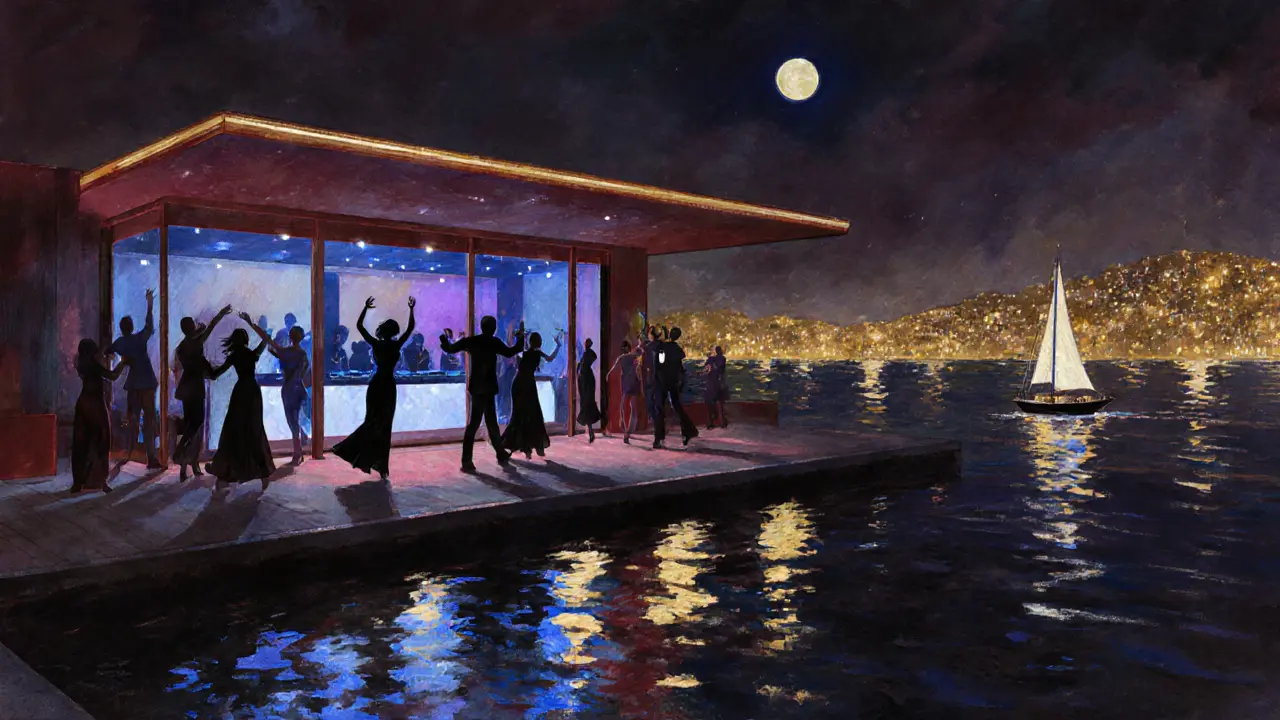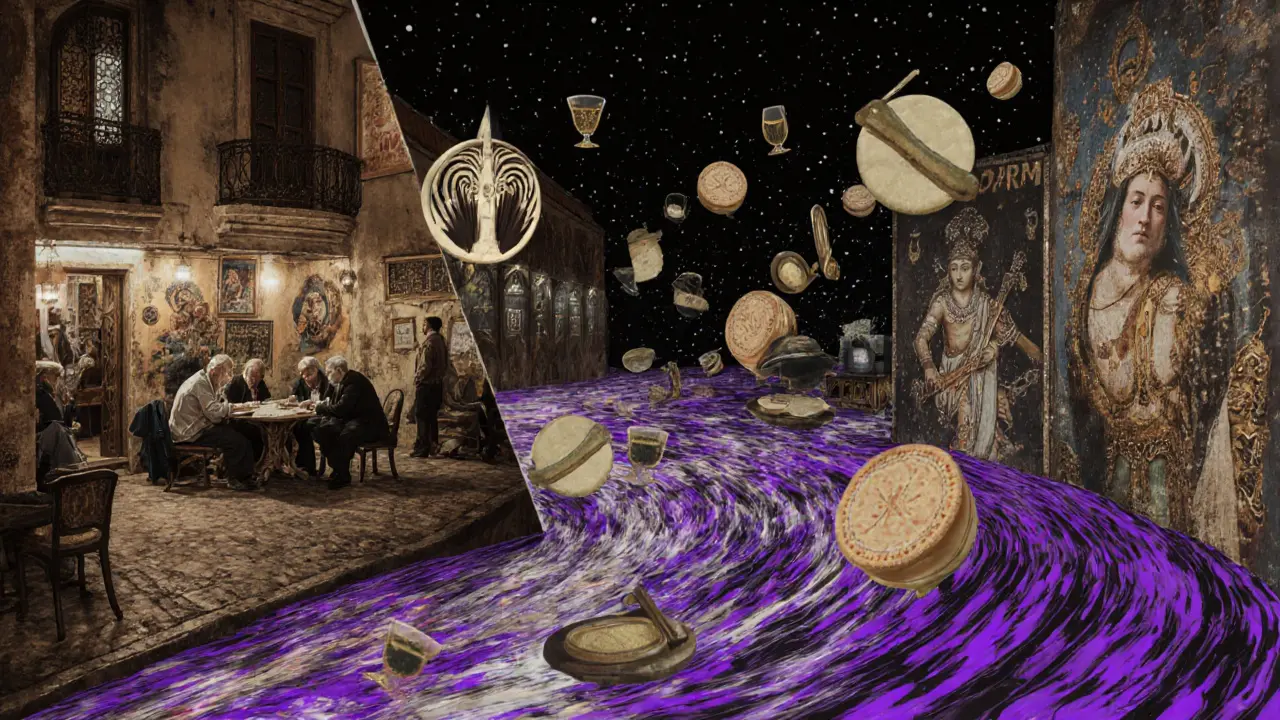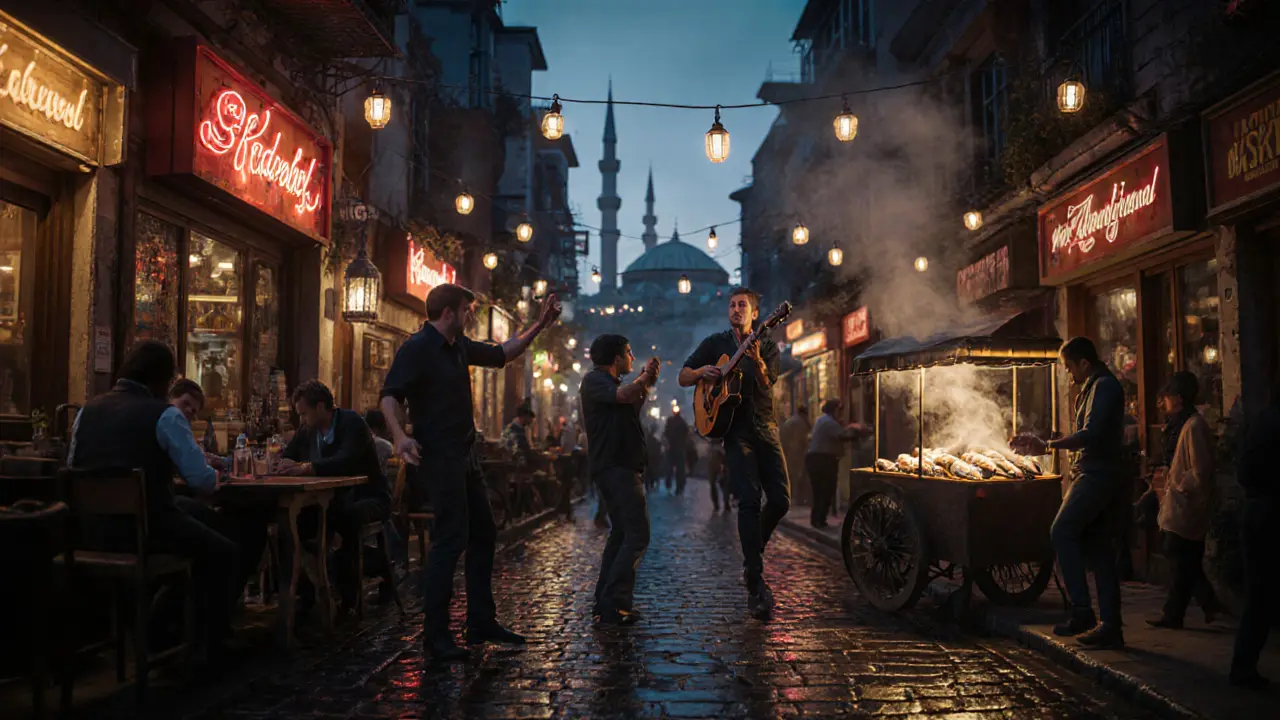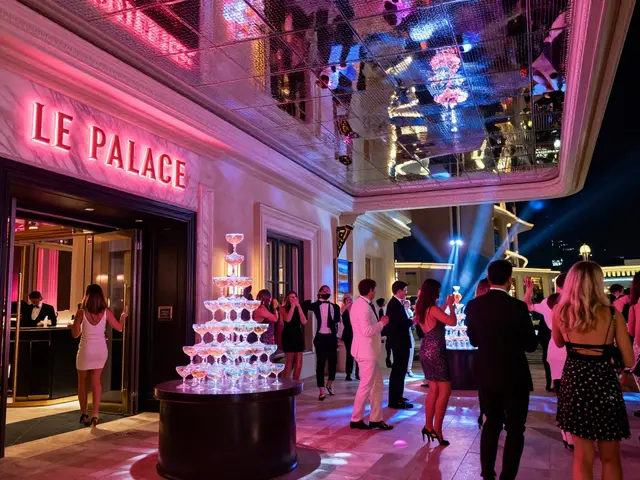When the sun sets over the Bosphorus, Istanbul doesn’t sleep-it wakes up.
You can walk through the Grand Bazaar at noon and feel the weight of centuries. But when midnight hits, the city sheds its ancient skin and becomes something wilder, brighter, louder. This isn’t just a city that has nightlife. Istanbul is nightlife. It’s the thump of bass echoing off 16th-century minarets. It’s the smell of grilled mackerel from a street vendor mixing with cigarette smoke and expensive perfume. It’s strangers dancing on tables in Kadıköy while a jazz singer croons in Turkish beside them.
There’s no single place to call the heart of Istanbul’s night. It shifts every night. One week it’s the rooftop bars of Beyoğlu, where you sip raki with a view of the Golden Horn. The next, it’s the underground techno dens in Kadıköy, where the walls shake and no one speaks English. The city doesn’t have one scene-it has dozens, layered like baklava, each slice offering something different.
Where the locals go after midnight
Most tourists head straight to Istiklal Avenue. It’s loud, it’s bright, it’s packed. But if you want to know where Istanbul’s real night lives, you need to go where the locals do.
Head to Kadıköy on the Asian side. It’s less touristy, more real. The streets here are lined with tiny bars that don’t have signs-just a flickering bulb or a line of people waiting outside. Try Bar 23, where the owner pours homemade rakı and plays 90s Turkish rock. Or Elma, a cozy spot with vinyl records spinning and a menu of mezze that tastes like your grandmother’s kitchen. People come here to talk, not to take photos. They stay until 4 a.m., then walk home through the quiet streets, laughing.
On the European side, Çiçek Pasajı (Flower Passage) is where the old guard still gathers. It’s a narrow arcade filled with historic meyhanes-traditional Turkish taverns. Order a bottle of raki, some grilled octopus, and watch the old men play backgammon while a singer belts out Ottoman ballads. It’s not flashy. But it’s alive. And it’s been going strong since 1876.
The clubs that turn Istanbul into a dance floor
If you’re here for music, Istanbul has clubs that rival Berlin, London, or Tokyo. But they don’t advertise. You find them by word of mouth.
Reina sits on the Bosphorus shoreline. It’s the most famous. Big names play here-Diplo, Charlotte de Witte, Amelie Lens. The crowd is a mix of locals, expats, and tourists with deep pockets. Dress code is strict. No sneakers. No hoodies. But if you get in, you’ll dance under open skies with the city lights glittering across the water.
For something rawer, go to Bar 64 in Nişantaşı. It’s small, dark, and packed with DJs who play rare techno and house. No VIP section. No bottle service. Just a basement, a sound system that could shake concrete, and people who came to lose themselves.
And then there’s Karma-a club that opens at 2 a.m. and doesn’t close until noon. It’s hidden behind a nondescript door in Beyoğlu. You need a password. You get it from a friend, or from the bouncer if you look like you belong. Inside, the walls are covered in murals of Turkish mythological figures. The music? A mix of Anatolian folk samples and deep house. People dance like they’re trying to summon something ancient.

The bars that don’t look like bars
Some of Istanbul’s best nights happen in places you wouldn’t guess are open after dark.
Asma Bar is a hidden garden behind a bookshop in Cihangir. You walk through a curtain of hanging plants, and suddenly you’re in a courtyard with fairy lights, wooden benches, and a bartender who knows your name by the second drink. They serve cocktails made with Turkish herbs-sage, thyme, sumac. No neon. No loud music. Just quiet conversation and the sound of a distant call to prayer.
Elif Bar is another secret. It’s a tiny space above a bakery in Karaköy. The owner used to be a jazz pianist in New York. Now he plays live every Friday. The crowd is mostly artists, writers, and students. No cover charge. No drinks over 120 Turkish lira. You leave with a warm simit in your pocket and a song stuck in your head.
What to expect-and what to avoid
Istanbul’s nightlife is safe. But it’s not always predictable.
Police are common near tourist spots, but they’re usually just there to keep things calm. Don’t expect the same level of enforcement as in Paris or London. People drink raki until dawn and still catch the ferry home. No one bats an eye.
But watch out for scams. Some bars in Istiklal will charge you 500 lira for a single cocktail. They don’t show prices. They don’t give receipts. Walk away. There are dozens of better places nearby.
Also, don’t assume all clubs are open every night. Many close on Mondays. Some only open on weekends. Check Instagram pages or ask your hotel. Don’t rely on Google Maps-half the clubs there are outdated.
And remember: Turkish people don’t party to get drunk. They party to connect. A night out here isn’t about hitting five clubs. It’s about one good conversation, one perfect song, one moment where the music and the city feel like they’re breathing together.

When to go and how to plan
The best time to experience Istanbul’s nightlife? Late September through November. The summer heat is gone. The winter chill hasn’t set in. The air is crisp. The crowds are thinner. And the energy? It’s electric.
Plan this way: Start with dinner at a meyhane around 8 p.m. Move to a bar for drinks by 11. Then, head to a club by 1 a.m. Don’t rush. The night lasts until sunrise. The city doesn’t rush.
Wear comfortable shoes. You’ll walk a lot. Bring a light jacket. Even in November, the breeze off the Bosphorus bites. And carry cash. Many places don’t take cards.
What makes Istanbul’s nightlife different
It’s not just the location. It’s not just the music. It’s the mix.
You’ll hear a Kurdish folk song played on a synthesizer next to a Turkish rap track that samples a 1920s oud. You’ll dance next to a German expat, a Syrian refugee, a Russian banker, and a 70-year-old Turkish grandmother who comes every Friday for the live tar music. No one asks where you’re from. No one cares. You’re here. That’s enough.
This is a city that has seen empires rise and fall. It’s been occupied, rebuilt, banned, and reborn. And every night, it throws a party that says: We’re still here.
There’s no other place on earth where the call to prayer and a bass drop happen in the same block. Where ancient mosques glow under neon signs. Where you can drink wine in a mosque-turned-bar and still feel the weight of history.
That’s why people come back. Not for the clubs. Not for the drinks. But for the feeling-that in Istanbul, the night doesn’t hide the past. It sings it louder than ever.
Is Istanbul nightlife safe for solo travelers?
Yes, Istanbul is generally safe for solo travelers at night. The city has a strong police presence in tourist areas, and locals are used to foreigners enjoying the nightlife. Stick to well-known neighborhoods like Beyoğlu, Kadıköy, and Karaköy. Avoid isolated streets after 2 a.m., and don’t accept drinks from strangers. Most bars and clubs have security, and violent incidents are rare. Just use common sense-you’ll be fine.
What’s the legal drinking age in Istanbul?
The legal drinking age in Turkey is 18. You’ll need to show ID at most clubs and bars, especially in tourist zones. Some places may be stricter and ask for a passport. Alcohol is widely available, but public drinking is technically illegal outside licensed venues. You won’t get fined for having a beer on a park bench, but you might get a warning. Stick to bars and restaurants to avoid any hassle.
Do I need to dress up for Istanbul clubs?
It depends on the place. Reina and other upscale venues enforce a smart-casual dress code-no shorts, flip-flops, or hoodies. Think jeans, a nice shirt, closed shoes. For underground clubs like Bar 64 or Karma, you can wear whatever you’re comfortable in. Streetwear, sneakers, even ripped jeans are fine. The vibe is more about attitude than appearance. When in doubt, dress slightly nicer than you think you need to.
Can I find English-speaking staff in Istanbul clubs?
In tourist-heavy areas like Istiklal and Reina, yes-most staff speak basic to fluent English. But in local spots like Elma in Kadıköy or Asma Bar in Cihangir, English is rare. That’s part of the charm. Learn a few Turkish phrases: "Teşekkür ederim" (thank you), "Lütfen" (please), "Ne kadar?" (how much?). Locals appreciate the effort. And you’ll have better conversations.
What’s the best way to get around Istanbul at night?
The safest and easiest option is the metro or ferry. Istanbul’s public transport runs until 2 a.m. on weekdays and until 4 a.m. on weekends. The metro connects Beyoğlu to Taksim and Kadıköy. Ferries run across the Bosphorus and are a beautiful, cheap way to end the night. Taxis are plentiful, but use BiTaksi or Uber to avoid overcharging. Avoid walking long distances alone after midnight, especially near the old city.
If you’re looking for a night that feels like a story you’ll tell for years, Istanbul delivers. It doesn’t just offer parties. It offers moments-raw, real, and unforgettable. The city doesn’t care if you’re a tourist, a local, or a stranger passing through. If you’re willing to stay up, listen close, and dance without asking why, you’ll leave with more than memories. You’ll leave with a piece of Istanbul’s soul.


